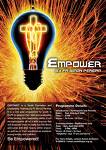

Donne On The Incarnation
from titusonenine
Twas much,
that man was
made like God before,
But that God should
be like man
much more.
–John Donne.





The Lord's love in our hearts helps us find the right words to reach the lost.
He looked burly and not the sort of taxi driver you'd fool around with. I thought twice and decided to share Christ with him; we exchanged names. Call me Jorge, he said.
I asked him if he was planning to go to the Cabildo today. He said "NO" and went into a tirade against the civic leaders of Santa Cruz, accusing them of being elitist and not sharing their wealth with the poor. Roman priests, nuns and Christian pastors were not spared. According to Jorge, Roman priests and nuns were well taken care of at the expense of the simple folk in the churches; Pastors were no better because they were taking advantage of the people's ignorance. A staunch supporter of President Evo, Jorge said, "Evo is the only president who is looking out for the poor". I was a little taken aback by his support for the government because he was a fair skinned native cruceñan from eastern Bolivia. People from this sector are avowed opponents of President Evo.
How does one share Jesus with the "Jorges" of this world? Well, I told him that he was right; priests and pastors had indeed failed to live up to their calling as God's servants. Jorge remained silent as I told him that Jesus, unlike his servants, is faithful and a person of great integrity. I find that talking about Jesus is a powerful witnessing tool. The Lord's love in our hearts for the lost helps us find the right words to reach those who need him the most. Sometimes its not what we say but the way in which the Holy Spirit fills our words with the Lord's love for the lost. His words were measured and less offensive; he nodded his head in agreement with me about Jesus. I invited him to our Christmas Eve celebrations and prayed for him. He thanked me for the conversation and sped away. I felt a little frustrated that I could not close the deal and lead him to Christ. He appeared to be very hard but there was a softening towards the end.
Pray for Jorge. I'm sure the Lord will send someone else to build on what the Holy Spirit did through me. And pray for discernment, wisdom and boldness to evangelise!


 CLEANING AND PAINTING THE CHURCH SANCTUARY
CLEANING AND PAINTING THE CHURCH SANCTUARY The men's ministry got together and decided to clean the church sanctuary and to paint the walls. On your right is Ariel; his dad Beto, brought him along to help out.





 UNDERSTANDING DIVORCE & REMARRIAGE
UNDERSTANDING DIVORCE & REMARRIAGE


POPE BENEDICT AND ARCHBISHOP R. WILLIAMS FACE THE REALITY OF IRRECONCILABLE DIFFERENCES.
The Archbishop of Canterbury and the Pope met in Rome; they released a statement which was full of general pleasantries except for the passage below in orange.
Certain realities cannot be glossed over; the unbridgeable impasse between Rome and Canterbury is one of them. Rome finds it hard, almost impossible, to renounce its marian dogmas nor its claim to episcopal and ecclesiatical supremacy. Rome has never renounced its call for us to return to her, the Mother church. Its hard to imagine a Pope ever making an ecumenical pilgrimage to Lambeth Palace!
Anglicans are also in holy disarray. The election of a practising gay to the episcopate in the US together with the consecration of women bishops in the Anglican Church have not only sunk any hope for unity between the Anglican and Roman ecclesiastical bodies it is also forcing the the Anglican Communion to re-draw itself within catholic and apostolic boundaries. No one has his finger on what the Anglican Communion will look like after Lambeth 2008. These are the new developments which are characterised as being divisive for Anglicans in the joint statement; they present serious obstacles to our ecumenical progress. On a positive note, the divisiveness of the present Anglican drama could be the birth pangs of a biblically centred catholic and apostolic identity.
Here is the excerpt from the statement released after the meeting between the Archbishop Of Canterbury and the Holy Father:
"In this fraternal visit, we celebrate the good which has come from these four decades of dialogue. We are grateful to God for the gifts of grace which have accompanied them. At the same time, our long journey together makes it necessary to acknowledge publicly the challenge represented by new developments which, besides being divisive for Anglicans, present serious obstacles to our ecumenical progress. It is a matter of urgency, therefore, that in renewing our commitment to pursue the path towards full visible communion in the truth and love of Christ, we also commit ourselves in our continuing dialogue to address the important issues in the emerging ecclesiological and ethical factors making that journey more difficult and arduous".
The anglo-catholic parts of the Anglican communion will probably shake their heads and join the cry of the psalmist, how long oh Lord, how long. The low evangelical anglicans will shrug their shoulders and say, so what? Some might go into a state of shock to discover that Anglicans and Catholics have been talking about a visible union for many years. In Latin America, especially in many parts of the province of the Southern Cone, any talk of rapprochement with Rome, is akin to asking a Christian to converse with the unearthed remains of a dead relative convicted of paedophilia.
Until our Lord returns the only visible unity between Rome and Canterbury is our common baptism in Christ. Maranatha!






 SOMETHING TO CHEER ABOUT!
SOMETHING TO CHEER ABOUT!
HANDS FULL ON SUNDAY!
A Youth Pastor Had The Opportunity But Did Not Share the Gospel With Che Guevara!
3 Ten Year Olds Sit Through A 40 Minute Adult Bible Teaching Without Fidgetting!
I had my hands full last Sunday. The Senior Clergy was on leave and I covered his duties which included lots of teaching, preaching, counselling and administrative stuff. The lay leaders were out in full force and did their part in ushering, preparing breakfast and helping distribute the wine and the wafers. We had a few newcomers. One of our members was weepy because she could not witness her son's marriage in the States; the US embassy had rejected her application for a visa (a very common outcome due to the illegal imigration)
As usual its the priestly task of preaching, teaching and celebrating the eucharist that gets my juices flowing. These days I try to not only evangelise through my messages but to also get christians to witness for Christ to non christians. Getting people fired up to do evangelism can be challenging, frustrating and rewarding. I closed my sermon with a story of a youth pastor who, although presented with many opportunities, did not share Christ with Che Guevara when Che was a youngster; the story is documented in a book written by Junior Zapata. Che Guevara has a hypnotic hold over the left and the dreamers in Bolivia (as well as in Latin America) partly because he was killed in the jungles of Bolivia. He is now part of the pantheon of heroes in Latin American. Zapata rhetorically asks, "What would have happened, to Latin America, if Guevara had become a Christian". The Lord brings people into our paths so that we can share Jesus with them.
At the nigth Service I taught on the Christian perspective of "Life After Death". I saw 3 ten year olds enter the sanctuary with their dad. He came to the night service because he could not come for the morning Eucharist. My heart sank because my teaching was going to be long and directed to adults. It was an interesting experience because the 10 year olds sat through the 40 minute exposition of the intermediate state, heavenly rewards, judgement, and the final restoration of creation without making a fuss or throwing a tantrum. Unbelievable. There were moments when they looked as if they were listening to the teaching! We have no Sunday School during the night services. One of the them actually responded to my prompting to read some of the Scripture passages aloud during the sermon.
After the service I went to buy a take-out for the family; I returned home, tired, and thankful for the day's experiences.


 It was a hot and humid Sunday morning in Santa Cruz Bolivia. People were using their bulletins as a fan. We were celebrating the witness of the Saints departed last Sunday. ALL SAINTS occupies a special place in my heart. I pastored a church called ALL SAINTS in Singapore before my departure for Bolivia nearly 14 years ago.
It was a hot and humid Sunday morning in Santa Cruz Bolivia. People were using their bulletins as a fan. We were celebrating the witness of the Saints departed last Sunday. ALL SAINTS occupies a special place in my heart. I pastored a church called ALL SAINTS in Singapore before my departure for Bolivia nearly 14 years ago.